2-2 Assistance for Ensuring Peace, Stability, and Security
(1) Peacebuilding Assistance
Regional and inter-state conflicts arising from ethnic, religious, and historical differences continue to pose challenges for the international community. Such conflicts generate a great number of refugees and internally displaced persons (IDPs), resulting in humanitarian crises and violations of human rights. Furthermore, these conflicts undermine the progress made through long-term efforts, and cause massive economic losses. Therefore, it is important for the entire international community to engage in “peacebuilding” in order to build foundations for development to prevent conflicts, avoid their recurrence, and consolidate sustainable peace. For instance, the UN Peacebuilding Commission, established in 2005, has been engaged in discussions on a coherent approach to support conflict resolution, recovery, reconstruction, and nation-building. The importance of peacebuilding has also been recognized at high levels, on such occasions as meetings of the UN General Assembly.
< Japan’s Efforts >
Japan provides various types of supports, including assistance for refugees affected by conflicts, food assistance, and electoral assistance for political peace processes. After a conflict is resolved, Japan assists in Disarmament, Demobilization and Reintegration (DDR) of ex-combatants in order to promote the consolidation of peace. Japan also provides support to rebuild the security sector to ensure domestic stability and security. Japan extends support for the reconstruction of affected countries in such areas as the repatriation and resettlement of refugees and IDPs, and the rebuilding of basic infrastructure. Furthermore, in order to consolidate sustainable peace and prevent the recurrence of conflicts, Japan engages in efforts in social sectors such as healthcare and education as well as the reinforcement of the governmental, judicial, and police functions, and the development of economic infrastructure and institutions. In such undertakings, maximum consideration is given to the importance of the roles that women can play in peacebuilding. In order to provide this support in a seamless manner, Japan also extends bilateral assistance through international organizations together with grant, technical cooperation, and ODA Loans.
The Development Cooperation Charter approved by the Cabinet in February 2015 outlines that Japan would strengthen coordination between development cooperation and international peace cooperation activities such as UN peacekeeping operations (PKOs). In the fields where UN PKOs are deployed, many initiatives are under way which contribute to development, including efforts for protecting refugees, women, and children affected by conflict and developing basic infrastructure. To maximize their effects, it remains important that Japan promotes coordination among these activities.
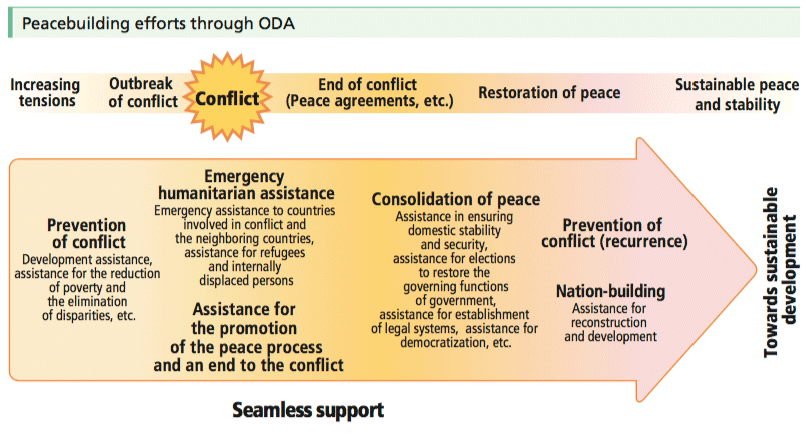
| Emergency Humanitarian Assistance Related to Conflict
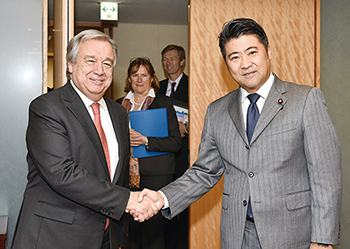
State Minister for Foreign Affairs Seiji Kihara receives a courtesy call from United Nations High Commissioner for Refugees António Guterres in November 2015.
In addition to bilateral cooperation, Japan provides emergency humanitarian assistance through international organizations, such as the Office of the United Nations High Commissioner for Refugees (UNHCR) and the International Committee of the Red Cross (ICRC), among other bodies, to ensure the life, dignity, and security of the most vulnerable victims of conflict and to help each person get back on their feet and become self-reliant, in accordance with the fundamental principles of humanitarian assistance, i.e., (i) humanity, (ii) impartiality, (iii) neutrality, and (iv) independence. In May 2014, Japan provided $12 million (approximately ¥1.164 billion) in Emergency Grant Aid for IDPs in South Sudan and refugees who fled to neighboring countries as a result of the armed clashes that broke out in late 2013 in South Sudan, which gained independence in 2011 following over two decades of civil war.
When providing emergency humanitarian assistance through international organizations, Japan strives to implement visible assistance by collaborating with JICA, Japan’s development cooperation implementing agency, as well as private companies. For example, Japan implements refugee assistance through UNHCR by collaborating with JICA to provide seamless assistance during the transition phase from emergency to reconstruction assistance.
In addition, as of July 2015, 47 NGOs are members of the Japan Platform (JPF), an emergency humanitarian aid organization established in 2000 through a partnership among NGOs, the Government of Japan, and business communities (see “c. Financial Cooperation for NGO Projects”). JPF utilizes ODA funds contributed by MOFA as well as donations from the private sector and individuals to carry out emergency humanitarian assistance, including the distribution of Non-Food Items and livelihood recovery, for example, when a major disaster occurs or a vast number of refugees flee due to conflict.
In FY2014, JPF implemented 81 projects through 11 programs, including assistance for Iraqi and Syrian refugees and IDPs, emergency assistance for South Sudan, humanitarian assistance for Afghanistan and Pakistan, reintegration assistance for refugees/IDPs in Myanmar, and the 2014 Palestine/Gaza humanitarian assistance.
| Support for Refugees and Internally Displaced Persons (IDPs)
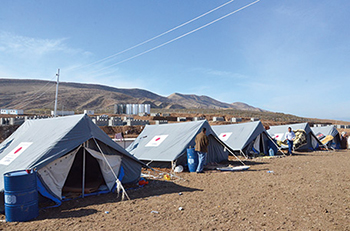
Tents provided by Japan for Syrian refugees in Iraq.
Given the situation in Syria and other countries, the number of refugees and IDPs at the end of 2014 stood at its highest level since the end of World War II. As humanitarian conditions become more severe, Japan is providing assistance to refugees and IDPs who are in the most vulnerable positions from the standpoint of ensuring human security.
Specifically, Japan works with international organizations including UNHCR to continually provide refugees and IDPs around the world with assistance in terms of food, shelter and basic living supplies. In cooperation with the World Food Programme (WFP), United Nations Relief and Works Agency for Palestine Refugees in the Near East (UNRWA), ICRC and other international institutions, Japan carries out humanitarian assistance for refugees and others while utilizing the expertise and coordinating abilities of these institutions, even in locations with dangerous public safety conditions.
Additionally, in September 2015, in a general debate at the UN General Assembly in New York, Prime Minister Shinzo Abe announced that in the same year, Japan would provide approximately $810 million for refugees and IDPs from Iraq and Syria, as well as for surrounding countries that have been hosting refugees, as part of Japan’s effort to address the issue of refugees and IDPs. Minister for Foreign Affairs Fumio Kishida, who also traveled to New York for the UN General Assembly meeting, attended the G7 Outreach Foreign Ministers’ Meeting regarding the Call for Increased Humanitarian Assistance for Refugees and Displaced Persons and the High-level Side Event on strengthening cooperation on the migration and refugee issues under the new development agenda. During these meetings, Minister Kishida called on participants to enhance assistance for refugees and displaced persons and further strengthen the nexus between humanitarian assistance and development assistance. He also stated Japan’s intention to cooperate towards the World Humanitarian Summit scheduled to take place in Turkey in May 2016.
As part of this assistance, Japan has been providing assistance for refugees and IDPs in Syria and Iraq in the fields of health, hygiene, education and food. Japan also provides assistance to the surrounding countries accepting Syrian refugees. For example, Japan provided monetary assistance to Jordan for procuring medical supplies and equipment, in light of the increased financial pressure it is facing from accepting Syrian refugees. Furthermore, Japan authorized the long-term supply of funds to local governments in Turkey that are accepting Syrian refugees in order to improve the living environment of local residents through improving infrastructure services.
Lebanon
Education and Health Care Assistance for Syrian Refugees in Palestinian Refugee Camps
Scheme: Grant Assistance for Japanese NGO Projects (Japan Platform (JPF) Project)
(February 2014 – February 2015)
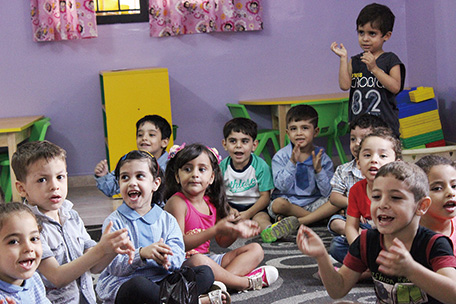
Syrian refugee children who have been through severe experiences enjoy a kindergarten class within a refugee camp in Lebanon. (Photo: Campaign for the Children of Palestine (CCP))
Around 1.2 million refugees from Syria have fled to Lebanon as of the end of March 31, 2015. Some 29% of the country’s total population is comprised of refugees, when also including Palestinian refugees. This is the highest ratio of any country in the Middle East. In this context, Campaign for the Children of Palestine (CCP Japan), a Japanese NGO, has assisted refugees in Lebanon for three decades and has aided Syrian refugees in Lebanon since 2013. CCP Japan provided education and health care assistance for Syrian refugees, particularly vulnerable children and women, who were living in six Palestinian refugee camps in 2014.
Throughout 2014, CCP Japan held kindergarten or remedial learning classes for 1,101 children who evacuated from Syria. 2,461 children also attended excursions and sports events hosted by CCP Japan to provide mental health support. For many of these children, this was the first time that they had received group education.
CCP Japan’s health assistance has reached 7,238 children, enabling them to receive group dental checkups and treatment. In addition, 433 children affected by the trauma of conflict have received ongoing counseling from psychiatrists and clinical psychologists, which has helped to ease symptoms in most cases.
CCP Japan has also held workshops to support the mental health of single mothers, with 240 women participating. As the crisis in Syria continues, this Japanese NGO, with the cooperation of the Government of Japan, will continue to expand their support for vulnerable refugees through education, health, food and living supplies in 2015 and beyond.
Jordan
Project for Formulating Water Supply Plan for the Host Communities of Syrian Refugees
Technical Cooperation (December 2013 – Ongoing)
The Programme for Urgent Improvement of Water Sector for the Host Communities of Syrian Refugees in Northern Governorates
Grant Aid (March 2014 – Ongoing)
Comprised of arid and semi-arid regions, Jordan is one of the countries with the fewest water resources in the world. Some 630,000 refugees from Syria have fled into Jordan since the outbreak of the crisis in Syria in 2011. This has given rise to a huge increase in demand for water and exacerbated Jordan’s water issues. Most Syrian refugees have fled to Jordan’s northern governorates of Irbid, Ajlun, Jerash and Mafraq, and these areas in particular are suffering from deteriorating water supply conditions, increasing sewerage and waste, and greater instances of illegal dumping. This has caused problems such as poor sanitation and blockages of sewer pipes.
In response to the situation, the Government of Japan has assessed the impacts on water and sewerage services caused by the influx of Syrian refugees and carried out exhaustive research on the state of water and sewerage services in host communities. Based on this, Japan is implementing projects that seek to achieve sustainable solutions.
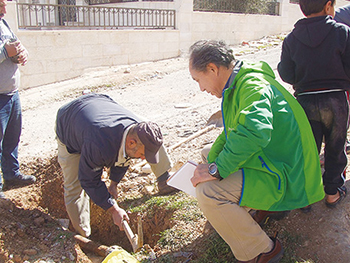
Staff members of the Yarmouk Water Company (YWC) conduct a water pipe leakage survey.
Specifically, a survey team was dispatched to the affected areas. The team conducted surveys with the assistance of the Government of Jordan and public water companies, in order to create plans for improving water supply and sewerage facilities, and to assist refugees. Jordan already had limited water supplies. They have now decreased even further amid the influx of Syrian refugees. As a result, water must be brought in once every two weeks using tanker trucks. The number of people who cannot pay for water is also rising. In addition, the water shortage means toilets cannot be flushed, so people are forced to put up with unsanitary conditions.
Based on these surveys, Japan and Jordan concluded a grant aid agreement for the Programme for Urgent Improvement of Water Sector for the Host Communities of Syrian Refugees in Northern Governorates in March 2014.
The influx of refugees has exacerbated water shortages in host communities. That is why improving the water sector is currently the top priority. New water supply pipes are being laid and improvements to existing water supply networks are being made, to provide water from newly developed sources to these communities. A medium-term plan on maintaining water supply and sewerage services is also being formulated. In addition, pipes need to be kept clean and free of blockages, and any leaks need to be found and repaired. In this way, Japan is working hard to address the needs of the local communities.
The water and refugee issues are both difficult challenges directly related to the sustainable growth of humankind. With Japan’s assistance, efforts are now underway in Jordan to address them. (As of August 2015)
| Protection and Participation of the Socially Vulnerable
Socially vulnerable people include persons with disabilities due to conflict or landmines, orphans, widows, ex-combatants including children affected by armed conflicts, and IDPs. Despite being susceptible to the impacts of conflict, the reality is that the socially vulnerable often receive delayed assistance in post-conflict recovery and often find it difficult to access the benefits of peace and reconstruction.
At the G8 Foreign Ministers’ Meeting held in April 2013, the G8 Declaration on Preventing Sexual Violence in Conflict was adopted in order to strengthen international efforts for preventing sexual violence and remedy human rights violations against women in conflict areas. Then State Minister for Foreign Affairs Nobuo Kishi attended the Global Summit to End Sexual Violence in Conflict held in London in June 2014, where he appealed to participants about the importance of women’s empowerment and their political, social, and economic participation.
In 2014, Japan provided capacity building assistance for police and judicial officials together with the United Nations Population Fund (UNFPA) in order to promote the elimination of violence against women in Afghanistan, where women are forced to live a life that is extremely restricted politically, socially, and economically. Japan also provided maternal health support for Syrian refugees through a partnership with a Japanese NGO.
| Reconstruction of Social and Human Capital
Japan supports the reconstruction of social capital and restoration of human capital who participate in economic activities in countries affected by conflict. This support is aimed at preventing new conflict from emerging or eliminating factors that could cause new conflict before reconstruction or nation building.
The reconstruction of social capital largely requires five steps: (i) development of social infrastructure; (ii) development of transportation, power grids and telecommunications networks; (iii) improvement of medical system functions; (iv) improvement of education system functions; and (v) food security. As for the reconstruction of human capital, while combining assistance aimed at medium- to long-term economic development, Japan seeks to help develop an economic environment as well as increase job opportunities and improve livelihoods with a focus on preventing social instability caused by rising unemployment and other factors.
| Restoring Public Order and Government Functions
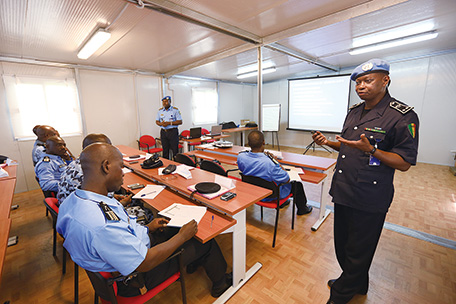
Re-education program for active police officers was launched in February 2014 at the National Police Academy in Abidjan, Côte d’Ivoire, with the goal of building peaceful and stable society through reinforcement of order maintenance capabilities. (Photo: Masataka Otsuka / JICA)
Public safety and government functions are extremely important when it comes to providing seamless assistance that spans from conflict resolution to recovery, reconstruction or nation-building. Given this, Japan believes it necessary to assist efforts in Disarmament, Demobilization and Reintegration (DDR) so that countries involved in conflict can consolidate peace and do not return to conflict. Additionally, Japan is working on efforts to ensure public safety and security, and to strengthen administrative, judicial, and police functions or restore government functions through the restoration of government systems and election reform.
As part of its election reform efforts, Japan announced that it would provide Cambodia with assistance in the form of (i) technical advice; (ii) dispatching experts; and (iii) provision of equipment. The dispatch of experts and other specific activities were initiated in September 2015.
| Clearance of Landmines, Unexploded Ordinance and Collection of Small Arms
In post-conflict regions, unexploded ordnance (UXO) including cluster munitions, which contain and eject multiple smaller submunitions upon detonation, and antipersonnel landmines remain, and illegal small arms are still widespread. These explosive remnants of war indiscriminately harm children and the general public. They not only hinder reconstruction and development activities, but also can become the cause of new conflicts. It is important to provide support that seeks to stabilize the domestic situation and ensure the security of the affected country, through assistance including the clearance of UXOs and landmines, the collection and disposal of illegal small arms, and the empowerment of landmine victims.
As a state party to the Convention on the Prohibition of the Use, Stockpiling, Production and Transfer of Anti-Personnel Mines and on their Destruction, as well as the Convention on Cluster Munitions, Japan has been actively promoting the universalization of these conventions by encouraging other nations to ratify or accede to them. Japan is also steadily implementing international cooperation for mine clearance, victim assistance, risk reduction education and other projects set forth in both conventions.
For example, the Japan Mine Action Service (JMAS), a specified nonprofit corporation, established a new landmine disposal course at the Cambodian Mine Action Centre (CMAC) in Cambodia using the Grant Assistance for Japanese NGO Projects in 2014, and is now working to establish a solid footing for landmine removal education. Furthermore, employees participating in this course are working to disseminate landmine removal techniques in Cambodia and surrounding countries.
In Afghanistan, the Association for Aid and Relief, Japan (AAR Japan), a specified nonprofit corporation, conducts outreach education to spread awareness on the dangers of landmines, UXOs and other remnants of conflict and on the proper ways to avoid them. Since FY2009, through the Grant Assistance for Japanese NGO Projects and JPF(Note 16), AAR Japan has conducted Mine Risk Education (MRE) in all parts of Afghanistan through various activities, including showing educational films in mobile cinemas. AAR Japan has also trained local trainers to conduct MRE. The people’s awareness has increased as a result of these efforts.
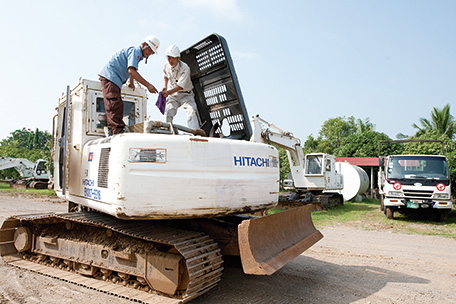
The Central Workshop of the Cambodian Mine Action Centre (CMAC), an organization engaged in removal of landmines and unexploded bombs in Cambodia. A Senior Volunteer (heavy machinery repair and maintenance), Mr. Masaki Tsunabuchi is conducting guidance on repair and maintenance of heavy machinery. (Photo: Shinichi Kuno / JICA)
In addition, from March 2014 until February 2015, Japan provided support for outreach education on the risks of explosive and non-explosive elements of war in Syria, Yemen, Chad, Mali, and South Sudan through UNICEF.
Laos is one of the countries deeply affected by UXOs. In 2011, a project focusing on countermeasures for UXOs was set up, and its three pillars of cooperation are: (i) dispatching an expert on UXOs; (ii) providing equipment; and (iii) South-South Cooperation. Japan has experience in supporting Cambodia to clear landmines since the 1990s, and it has been implementing a 3-year South-South Cooperation project to facilitate Laos and Cambodia to share knowledge and experiences with each other through holding several workshops on UXO/Mine Action. This cooperation aimed to share their knowledge and experience on techniques, training, drafting national standards and supporting victims.
In March 2015, Japan supported landmine and UXO countermeasures including removal and awareness education through United Nations Mine Action Service (UNMAS) in Afghanistan, South Sudan, Somalia, the Democratic Republic of the Congo, and the Palestinian Territories (Gaza). In South Sudan, Japan has been providing assistance in coordination with the Japan Self-Defense Force personnel performing ongoing PKO operations. Additionally, through the Japan-UNDP Partnership Fund, Japan is supporting a project to reduce small arms in the Economic Community of West African States (ECOWAS) conducted by the Kofi Annan International Peacekeeping Training Centre in Ghana and the training of mine-clearing personnel in Africa conducted by the Center for Humanitarian Demining Training (Centre de Perfectionnement aux Actions post-conflictuelles de Déminage et de Dépollution: CPADD) in Benin.
To tackle the issues of small arms and light weapons, Japan provides support for the collection, disposal, and appropriate storage management of small arms, combined with development assistance. With a view to improving security as well as strengthening the capacity to regulate the import and export of weapons, Japan also supports the development of relevant legal systems, capacity enhancement of customs agencies, police forces and other law enforcement agencies, and carries out DDR projects for ex-combatants and child soldiers.
| Human Resources Development for Peacebuilding
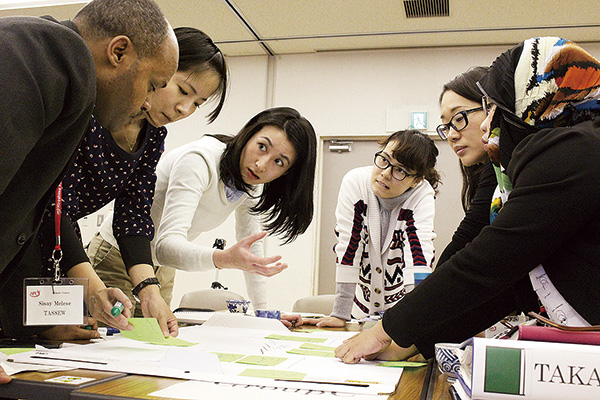
Discussion among participants in a training held under the Program for Human Resource Development for Peacebuilding.
Requirements in the field of peacebuilding, in terms of activities and the qualities of the people who carry them out, are becoming more diverse and more complex. In response to these needs on the ground, Japan conducted the Program for Human Resources Development for Peacebuilding from FY2007 to FY2014 to train civilian experts from Japan and other regions who will be capable of playing an active role in this field. Pillars of the program consist of coursework in Japan, where participants acquire the practical knowledge and skills required for the peacebuilding field, the Overseas Assignment, where participants work at field offices of international organizations in the peacebuilding field, and support for graduates to build up their careers. To date, 302 nationals from Japan and other countries have participated in the training courses. Many program graduates are now actively working in the field of peacebuilding in countries such as South Sudan, the Democratic Republic of the Congo and Afghanistan. Since FY2015, operations have been expanded as the Global Program for Human Resource Development for Peacebuilding and Development.
In 2015, the Government of Japan hosted the High-Level Seminar on Peacebuilding, National Reconciliation and Democratization in Asia. Government officials and others from Japan and abroad who have been involved in peacebuilding, national reconciliation and democratization in Asian countries were invited to attend the Seminar. They exchanged views on the lessons learned from Asia’s experience and disseminated it to the international community.
- Note 16: JPF is an organization launched by NGOs, business communities, and the Government of Japan in August 2000 in order for Japanese NGOs to carry out expedient and effective emergency humanitarian assistance in response to conflict or natural disasters.
A. Mindanao Peace Process
The conflict between the Government of the Philippines and Islamic rebel groups continued for 40 years in the Mindanao region in southern Philippines. To put an end to this history, the government and the Moro Islamic Liberation Front (MILF) engaged in peace talks from 2001. On March 27, 2014, a comprehensive peace agreement was signed between the two parties, marking a large step towards fundamentally resolving the Mindanao conflict.
Under this agreement, during the transition process until the inauguration of the new autonomous government (Bangsamoro(Note 17)) in 2016, the Bangsamoro Basic Law is to be enacted, a referendum is to be held, and a transitional governing entity is to be established. At the same time, various processes that are expected to contribute to the “normalization” of the situation have to be implemented smoothly, including the disarmament of MILF forces, the social reintegration of combatants, the dismantlement of the many private armed groups in the area, the restoration of security by creating a new police organization, and the promotion of socio-economic development which has lagged behind due to the conflict.
The steady execution of the peace agreement and whether or not the hurdles can be overcome in the lead-up to 2016 will be key to achieving true peace in Mindanao.
This requires the unremitting efforts of the Philippine government and MILF, as well as the support of the international community, including Japan.
< Japan’s Efforts >
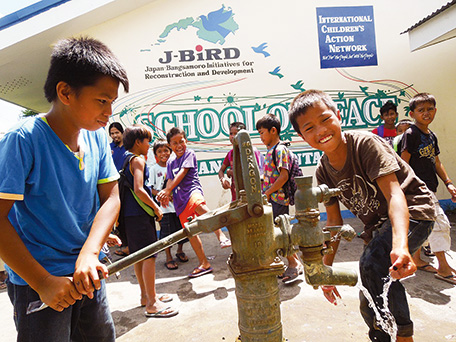
In front of the building of a School of Peace where peace education is implemented, in Mindanao, the Philippines. Clean water is now available in the school. (Photo: ICAN)
Based on the belief that peace in Mindanao will lead to peace and stability in this region, Japan has extended its support to the peace process for years. For example, Japan dispatched development experts from JICA to the Social and Economic Development Section of the International Monitoring Team (IMT) and conducted studies to identify the needed assistance. This led to Japan’s assistance for the development of elementary schools, wells, clinics, and vocational training centers. Japan has also carried out development cooperation projects intensively in former conflict areas, including Grant Assistance for Grass-Roots Human Security Projects. These measures which are known under the name of the “Japan-Bangsamoro Initiatives for Reconstruction and Development” (J-BIRD) are highly praised by the local people and the Philippine government. Furthermore, Japan is a member of the International Contact Group which participates in the peace talks as an observer and offers advice, and contributes to the advancement of the Mindanao Peace Process. In August 2011, the first leaders’ meeting between President Benigno S. Aquino III and MILF Chairman Al Haj Murad Ebrahim took place in Narita by the intermediation of Japan. This meeting helped establish mutual trust towards the resolution of the Mindanao peace issue.
After signing the Comprehensive Agreement on the Bangsamoro (CAB) in March 2014, JICA organized the Consolidation for Peace for Mindanao Seminar that took place in Hiroshima City in June 2014. With President Aquino in attendance, officials including MILF Chairman Murad and Secretary Teresita Quintos-Deles of the Office of the Presidential Adviser on the Peace Process (OPAPP) participated and stated their resolve towards moving the peace process forward. During President Aquino’s state visit to Japan in 2015, the Government of Japan announced the transition to the framework of “J-BIRD 2” with a greater focus on securing the economic independence of the Bangsamoro region. Japan will continue to expand and strengthen its support for the achievement of true peace in Mindanao based on the pillars of: construction of schools, clinics, wells, and other facilities; human resources development in the transition process; and economic development towards sustainable development (cooperation focused on agriculture, mining and manufacturing, infrastructure development, etc.).
In addition, Japan supports the peacebuilding process undertaken by Japanese NGOs using the Grant Assistance for Japanese NGO Projects. For example, the International Children’s Action Network (ICAN) conducted peace training at the primary and secondary education level and constructed schools on the island of Mindanao in the Philippines as part of a three-year project that started in FY2011. Since FY2014 it has been conducting mediation training between the parties of the conflict as part of efforts to consolidate peace at the local grassroots level.

The Seminar on the “Consolidation for Peace for Mindanao” held in June 2014 in Hiroshima City to discuss policies and challenges in the establishment of the Bangsamoro government. From left, Professor Kamarulzaman Askandar, University of Sains Malaysia; Al Haj Murad Ebrahim, chair of the Moro Islamic Liberation Front (MILF); Governor of Hiroshima Prefecture Hidehiko Yuzaki; Secretary Albert F. Del Rosario, Department of Foreign Affairs, the Philippines; President Benigno S. Aquino III; former JICA President Akihiko Tanaka; Secretary Teresita Quintos-Deles of the Office of the Presidential Adviser on the Peace Process (OPAPP); Professor Miriam Coronel-Ferrer, chair, the Philippines’ Government Peace Panel; and Mohagher Iqbal, chair of the MILF Peace Panel. (Photo: JICA)
- Note 17: “Bangsamoro” is the name which Islamic rebel groups use to refer to themselves.
B. Assistance to Afghanistan and Pakistan
The prolonged unstable situation in Afghanistan and Pakistan is a challenge, not only for these countries and the surrounding region, but also for the peace and security of the entire world. The international community, including Japan, actively supports Afghanistan to prevent the country from stepping back to a hotbed for terrorism. The new administration of President Ashraf Ghani was inaugurated after the first-ever democratic change of governments in the history of Afghanistan in 2014. At the end of the same year, the International Security Assistance Force (ISAF) handed over its security responsibility to the Afghan National Defense and Security Forces (ANDSF), and it is becoming increasingly more important to ensure stability in Afghanistan. In July 2015, the Government of Afghanistan and the Taliban held a peace talk which was mediated by the Government of Pakistan. In order for stability in Afghanistan, it is further important to obtain cooperation by Pakistan.
< Japan’s Efforts >
| Afghanistan
Japan has consistently extended assistance to Afghanistan. Japan’s assistance to Afghanistan since October 2001 totals approximately $5.9 billion (as of October 31, 2015).
Japan and Afghanistan jointly held the Tokyo Conference on Afghanistan on July 8, 2012. The conference, attended by representatives of about 80 countries and international organizations, issued an outcome document titled “The Tokyo Declaration.” At the conference, the Tokyo Mutual Accountability Framework (TMAF) was established to clarify the mutual commitment between Afghanistan and the international community for the sustainable development of Afghanistan and to regularly monitor and review the commitment. On that occasion Japan announced that it would provide up to approximately $3 billion of assistance to Afghanistan in about five years from 2012 in the fields of development and enhancement of security capabilities. Since 2012, Japan has extended approximately $2.5 billion of assistance to Afghanistan by the end of October 2015.
In April 2014, Afghanistan held presidential and provincial council elections in which the number of people who cast their votes far exceeded the previous presidential election held in 2009. In September 2014, the first-ever democratic change of governments was realized. At these elections, Japan provided ¥1,639 million in grant aid working with the international community to procure and provide necessary supplies for holding the presidential and provincial council elections, and to help transport these articles to polling stations across Afghanistan.
At the London Conference on Afghanistan held in December 2014, the international community and Afghanistan’s commitment under TMAF was reaffirmed, while the need to further follow up on this framework was confirmed as well.
At the Senior Officials Meeting for Follow-up of Tokyo Conference on Afghanistan held in Kabul in September 2015, the Self-Reliance through Mutual Accountability Framework (SMAF) was established as the new framework to succeed TMAF, in line with the priority matters cited by the current Afghan administration. This confirmed that Afghanistan and the international community will tackle the issues faced by Afghanistan under the principle of “mutual accountability.”
| Pakistan
Japan has been actively engaged in assisting Pakistan since Pakistan announced its intention to fight against terrorism in cooperation with the international community following the terrorist attacks in the United States in 2001. In April 2009, Japan hosted the Pakistan Donors Conference and pledged assistance of up to $1 billion(Note 18) to Pakistan over two years, which is being steadily implemented. In 2014, Japan extended a ¥5 billion ODA Loan to support energy sector reform by Pakistan.
To contribute to the improvement of the security situation in Pakistan, Japan has been providing assistance for education, health, vocational training, and other projects in the Pakistan-Afghanistan border area, and supporting Pakistan’s efforts to bring stability to people’s lives. In 2013, Japan extended assistance of approximately ¥2 billion for counter-terrorism measures in Pakistan in order to improve airport security capabilities at major international airports in Pakistan, including for the installation of X-ray inspection equipment. Additionally, Japan provided approximately ¥1.3 billion in assistance for IDPs in 2015 through UN organizations following the terrorism sweep operation implemented.
- Note 18: Includes aid for flooding in FY2010.
C. Middle East Peace (Palestine)
The Palestine issue is at the core of the Arab-Israeli conflict that has continued for more than half a century. Middle East peace is an issue that wields significant impact on the stability and prosperity of Japan and the rest of the world. Japan supports a two-state solution whereby Israel and a future independent Palestinian state live side by side in peace and security. To promote this, it is essential to prepare for nation-building through socio-economic development of Palestine, which is one of the parties of the peace process. Since the establishment of the Palestinian Interim Self-Government Authority based on the Oslo Accords in 1993, the international community including Japan has been proactively extending assistance to the Palestinians.
Although Palestinians continue to feel significant discontent and antipathy towards the Israeli occupation, many years of occupation have made them economically dependent on the Israeli economy as well as on aid from the international community. These circumstances make the achievement of Middle East peace even more difficult. Israel’s occupation policy and widening regional disparities and a high unemployment rate driven by the sluggish economy are destabilizing factors in regional circumstances. Helping the Palestinian economy stand independently while improving living conditions for its people is the most important challenge in creating an environment where Palestinians can negotiate with Israelis for genuine peace.
< Japan’s Efforts >
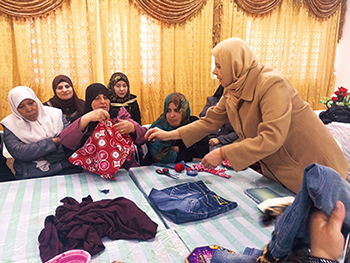
Women at a Palestinian refugee camp in Ajloun, a governorate in the northern part of Jordan, learn to make bags from old clothing items at a training program for entrepreneurs. (Photo: Maki Niioka / JICA))
Based on the perspective that “peacebuilding” is one of the priority issues of development cooperation, Japan has positioned its assistance to the Palestinians as one of the important pillars of its measures to contribute to the Middle East Peace Process. In particular, Japan, as one of the major donor countries, has provided $1.47 billion in total to the Palestinians since the 1993 Oslo Accords along with the United States, the European Union (EU), and other countries. Specifically, Japan provides various types of humanitarian assistance through international organizations and NGOs, to improve the tragic living conditions of the socially vulnerable people in the West Bank (including East Jerusalem), people affected by conflict in the Gaza Strip, and others. Also, Japan proactively supports the Palestinian Authority to stabilize and improve its people’s lives, enhance the administrative and financial capacity, and promote sustainable economic growth. These efforts are aimed at preparing for future Palestinian nation-building and for a self-sustained Palestinian economy.
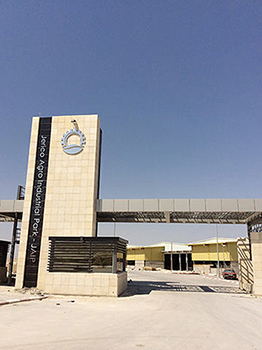
The Agro-Industrial Park in the outskirts of the city of Jericho.
Furthermore, since July 2006, Japan has advocated the initiative of the Corridor for Peace and Prosperity, as its unique medium- to long-term effort for future peaceful coexistence and co-prosperity between the Israelis and the Palestinians. The initiative aims to promote socio-economic development in the Jordan Valley area through regional cooperation among the four parties of Japan, Israel, Palestine and Jordan. Those four parties are working on the flagship project of the initiative, the establishment of an agro-industrial park in the suburbs of Jericho City. The park is expected to create about 7,000 jobs in the future.
In 2013, Japan launched a new initiative called the Conference on the Cooperation among East Asian Countries for Palestinian Development (CEAPAD) to help Palestine achieve economic independence by drawing on Asia’s experience on human resources development and private economic development. In March 2014, the second ministerial meeting was held in Indonesia. In addition, to date, meetings have been held on triangular cooperation (see this) for human resources development and on trade and investment expansion.
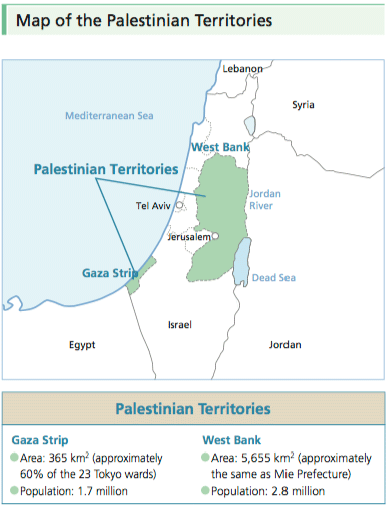
In June 2014, to meet emergency needs following conflicts between Israeli and Palestinian armed forces in the Gaza Strip, Japan extended approximately $7.8 million of food, water, and sanitation assistance through international organizations and Japanese NGOs.
In January 2015, Prime Minister Shinzo Abe visited Palestine where he met with President Mahmoud Abbas and extended approximately $100 million in new assistance to aid reconstruction in Gaza, socio-economic development, finance, and medical and healthcare, among other areas. Prime Minister Abe conveyed that the assistance pledge of $200 million stated at the second ministerial meeting of CEAPAD held in March 2014 will now be realized as a result, and President Abbas expressed his appreciation for these supports.
On the occasion of the United Nations General Assembly in September 2015, the Middle East Quartet Outreach Meeting was held, with the participation of the five permanent members of the United Nations Security Council, major Arab countries, several European countries, and Japan. At the meeting, Foreign Minister Kishida announced approximately $12 million in new assistance. It is hoped that this will support the socio-economic development of Palestine.
Palestinian Territories
Establishing a Facilitation Mechanism with the Islamic Development Bank and the Ministry of Planning and Administrative Development
Technical Cooperation (March 2014 – Ongoing)
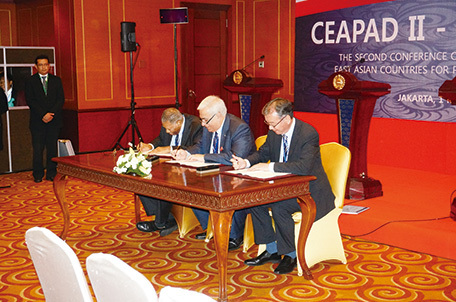
The signing ceremony. (Photo: JICA)
At the Conference on the Cooperation among East Asian Countries for Palestinian Development (CEAPAD) held in Jakarta, Indonesia, in March 2014, Japan concluded an official agreement with the Islamic Development Bank (IDB) and the Ministry of Planning and Administration Development (MoPAD) for establishing a trust fund, the CEAPAD Facilitation Mechanism (CEAFAM). This marks the first ever trust fund for development assistance to be established by Japan and an Arab development bank.
Now that CEAFAM has been established, IDB is providing funds and assistance through its network in Islamic countries, while MoPAD is examining and coordinating domestic development needs. East Asian countries are also planning training and seminars that contribute to development needs in the Palestinian Territories, while at the same time receiving technical assistance from CEAFAM for financing and implementing development projects.
Meanwhile, JICA is providing technical cooperation by sharing development assistance know-how and offering services matching Palestinian development needs with areas in which East Asian countries have a comparative advantage. Specific areas of assistance include agricultural development, tourism development, ICT development, and the manufacture and development of electric lights.
Assistance for the Palestinians is also important for realizing peace in the Middle East and stability in the region. The establishment of CEAFAM allows Japan to combine its long-standing experience in technical cooperation and human networks with the IDB’s ability to leverage the financial resources and networks of the Persian Gulf countries. This joint effort has helped earn ever greater trust from the Palestinian Territories and initiate high quality and broad development assistance. (As of August 2015)
D. Sahel Region
The “Sahel(Note 19) countries” generally include the following eight countries – Mauritania, Senegal, Mali, Burkina Faso, Niger, Nigeria, Cameroon and Chad, although there is no strict definition.
Due to natural disasters such as drought, as well as poverty and the vulnerabilities of institutional capacity, issues of political uncertainty, terrorism, the illicit trade of arms and narcotic drugs, and the threats of organized crimes such as kidnapping are becoming ever more serious in the Sahel region. Moreover, Libya and other neighboring countries, which have vast lands including deserts, have difficulties in maintaining their borders sufficiently to prevent the entry and exit of terrorists and others, making the region a breeding ground for arms smuggling. Under these circumstances, it is necessary for the region and the international community to improve security capacity and strengthen governance to enable the state control to penetrate into border areas. It is also a priority to deal with humanitarian crises, such as the refugee issue, and to promote development.
< Japan’s Efforts >
Following the terrorist attack against Japanese nationals in Algeria in January 2013, Minister for Foreign Affairs Fumio Kishida announced the three pillars of foreign policy on January 29. In addition, at TICAD V in June 2013, Japan pledged to continue providing support for the consolidation of peace, including ¥100 billion in development and humanitarian assistance. Furthermore, Japan announced three new pillars of diplomatic policy(Note 20) to address the more frequent occurrence of terrorism, following the hostage crisis in February 2015 in which two Japanese nationals were killed, and as a part of its efforts, Japan has been rapidly promoting efforts to bring peace and stability to the Sahel region.
In 2014, Japan pledged to extend approximately $10 million in assistance to help Mali refugees. This included providing food and accommodation tents to refugees who fled from Mali to neighboring countries and assistance to UN Peacekeeping Operation (PKO) training centers to improve military and police capacities in West African countries. Japan also supports activities under the African Union Mission for Mali and the Sahel, which works for promoting the reconciliation and political process in Mali and the Sahel region.
Moreover, Japan has implemented the following plans to contribute to peace and stability in the Sahel region: (i) the plan for strengthening the coordination of humanitarian affairs and services in the Sahel region; (ii) the plan for improving security in the Sahel region through improved control of refugees and border security in Niger; and (iii) the plan to strengthen transnational anti-crime and anti-terror capacities along the border in Mauritania.
These assistance projects strengthen the regional ability to deal with the increase in inflow and proliferation of small arms, and also improve judicial services. As a result, the projects are expected to improve public safety and reduce the threat of potential terrorist attacks in the Sahel region, and by extension, improve the ability of the whole region to cope with these challenges.
In addition, Japan held the Japan-Africa Trade and Investment Forum relating to the Sahel Region in November 2014 from the perspective of promoting dialogue and cooperation with anti-terrorism and public safety officials in North Africa and the Sahel region. This forum consisted of presentations and discussions about the security situation in the Sahel region and the safety measures that should be taken for doing business in Africa. It also served to foster understanding about the situation in the Sahel region among representatives from the Japanese business community.
The Ministry of Justice (MOJ), through the United Nations Asia and Far East Institute for the Prevention of Crime and the Treatment of Offenders (UNAFEI), organized a training program for criminal justice practitioners in French-speaking African countries, which was called the Second Training on Criminal Justice in French-speaking African Countries. This program focused on themes such as improving investigations, legal actions, and trials as well as measures against organized crime. This training will contribute to the enhancement and development of the criminal justice system in French-speaking African countries, and thereby, address such global challenges as the deteriorating security situation and the serious issues of corruption in this region.
Japan will work more closely with countries in the Sahel region, international organizations, and other aid organizations to provide assistance steadily towards establishing peace and stability in the Sahel region.
- Note 19: “Sahel” is a semi-arid region that stretches along the southern edge of the Sahara desert. It generally refers to part of West Africa; however, in some cases it includes Sudan and the Horn of Africa area. The word “Sahel” originated from sāhil, which means “coast” in Arabic. The Sahel countries are also called the countries at the southern edge of the Sahara Desert.
- Note 20: The three pillars are: (i) strengthening counter-terrorism measures; (ii) enhancing diplomacy towards stability and prosperity in the Middle East; and (iii) assistance in creating societies resilient to radicalization.
E. South Sudan
In South Sudan, conflict broke out between the Sudan Peoples’s Liberation Army (SPLA) and SPLA in Opposition since December 15, 2013, leading to the deterioration of the humanitarian situation, including the rise of IDPs and refugees. Efforts for peace are under way with the Intergovernmental Authority on Development (IGAD), comprised of neighboring countries, acting as a mediator. In August 2015, President Salva Kiir Mayardit, former Vice President Riek Machar Teny, and other relevant parties signed an agreement regarding the resolution of the conflict in South Sudan, which immediately took effect. The agreement stipulates the immediate cessation of the conflict, the establishment of a transitional government of national unity, the holding of a national election and others. As a result of the prolonged conflict, South Sudan’s economy faces many difficulties, including fiscal deficit, inflation, and a lack of the necessary foreign currency reserves.
< Japan’s Efforts >
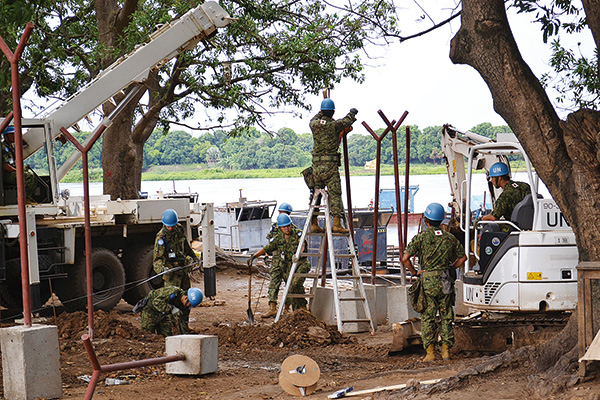
Construction of a security fence to ensure the safety of the Juba River Port in the South Sudan capital city, Juba. (Photo: Ministry of Defense)
Peacebuilding is one of the priorities of Japan’s diplomacy towards Africa. In particular, stability in Sudan and South Sudan is directly related to the stability of the whole of Africa. The two countries are therefore an area in Africa requiring intensive assistance for the consolidation of peace. With this understanding, Japan has disbursed over $1.4 billion to Sudan and South Sudan since 2005.
Japan continues to support the consolidation of peace through disarmament, demobilization and reintegration (DDR) of ex-combatants and lend assistance in fields dealing with basic human needs (BHN) so that the people of the two nations can actually realize that peace has been established and do not revert to conflict. Specifically, Japan provides Sudan with the support focused on meeting BHN and maintaining a food production base mainly in the regions affected by conflict. To South Sudan, in addition to the aforementioned support, Japan’s assistance has focused on development of infrastructure and governance.
At present, engineering units of the Japan Self-Defense Force (JSDF) have been dispatched to the United Nations Mission in the Republic of South Sudan (UNMISS). Japan is also implementing development and humanitarian assistance projects in coordination with the engineering units’ activities so that Japan can put forth its effort for stability and nation-building in South Sudan in an integrated manner. In 2013, the Unit implemented the “Project for the Rehabilitation of Juba Na-Bari Community Road” in coordination with a Grant Assistance for Grass-Roots Human Security Project. The Unit constructed a perimeter security fence for the port where the “Project for Improvement of Juba River Port” is being implemented by JICA using grant aid to the South Sudan capital of Juba. The engineering unit is currently building facilities inside the Protection of Civilian sites in response to the deterioration of the security situation since December 2013. Furthermore, by assisting the United Nations Mine Action Service (UNMAS), which is removing landmines and other hazards in areas where UNMISS is active, Japan is helping to facilitate the implementation of UNMISS operations, which JSDF is a part of.
South Sudan
Emergency Grant Aid to South Sudan Refugees and IDPs
Emergency Grant Aid (May 2014 – Ongoing)
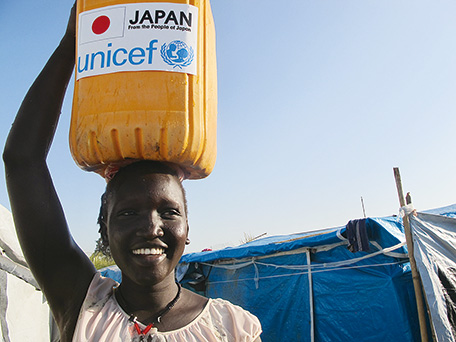
IDPs in South Sudan get access to safe and hygienic water. (Photo: UNICEF)
South Sudan gained its independence from Sudan in July 2011 after more than two decades of civil war. However, clashes between the Sudan People’s Liberation Army (SPLA) and SPLA in Opposition erupted on December 15, 2013. This increased factional strife within the government. These clashes also caused widespread acts of violence and human rights violations across the country, resulting in close to 1 million internally displaced persons (IDPs) and more than 200,000 refugees. Countless innocent women and children lost their lives in the constant violence.
The Government of Japan has contributed extensively to South Sudan’s post-independence nation building. In fact, even after the country fell into turmoil, Japan maintained its diplomatic and assistance efforts. Japan has continued to try to improve the situation in South Sudan, which is a matter of great importance to the international community.
The Government of Japan decided to extend Emergency Grant Aid totaling $12 million (approximately ¥1.164 billion) for areas requiring emergency humanitarian assistance. These areas included shelters in neighboring countries for refugees from South Sudan, as well as food, water and sanitation, health, and medical aid for IDPs. This aid was announced at the May 2014 Humanitarian Pledging Conference for South Sudan in Oslo, and was provided through the World Food Programme (WFP), the United Nations Children’s Emergency Fund (UNICEF), the United Nations High Commissioner for Refugees (UNHCR), the International Organization for Migration (IOM), the International Committee for the Red Cross (ICRC), and the United Nations Office for the Coordination of Humanitarian Affairs (OCHA).
This humanitarian assistance is aimed at fulfilling basic human needs. It has helped to provide emergency relief supplies and services to the people, especially the socially vulnerable, such as women and children, in South Sudan. These funds are also being used to improve the lives of South Sudanese refugees in Ethiopia across the country’s southern border.
Japan will continue to provide this assistance to South Sudan, in order to improve the lives of its people, and to establish a peaceful society as quickly as possible. (As of August 2015)
